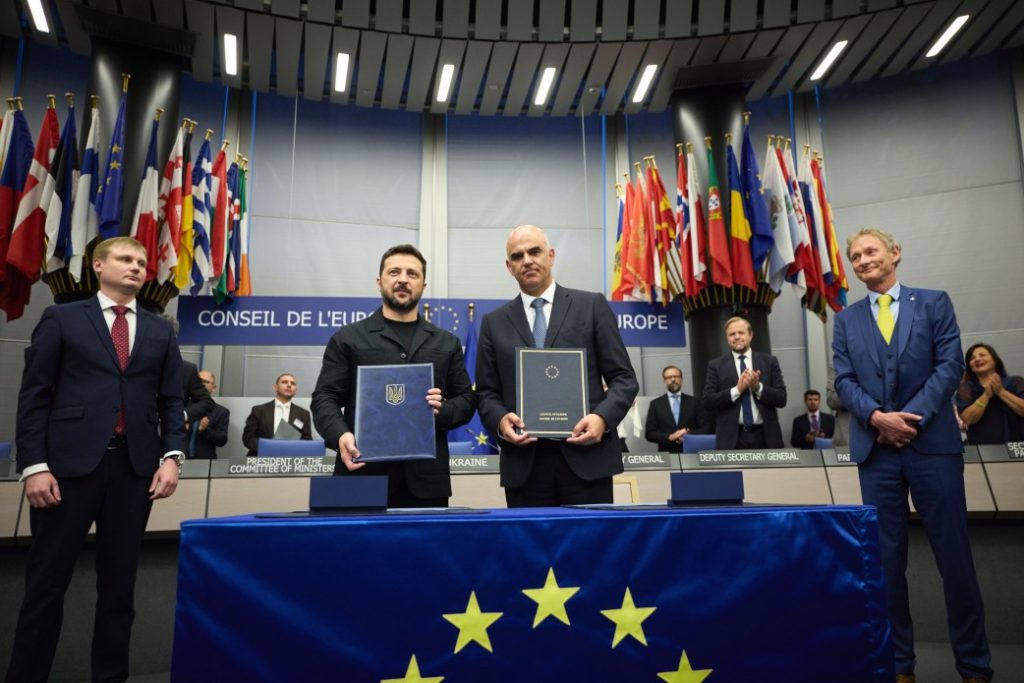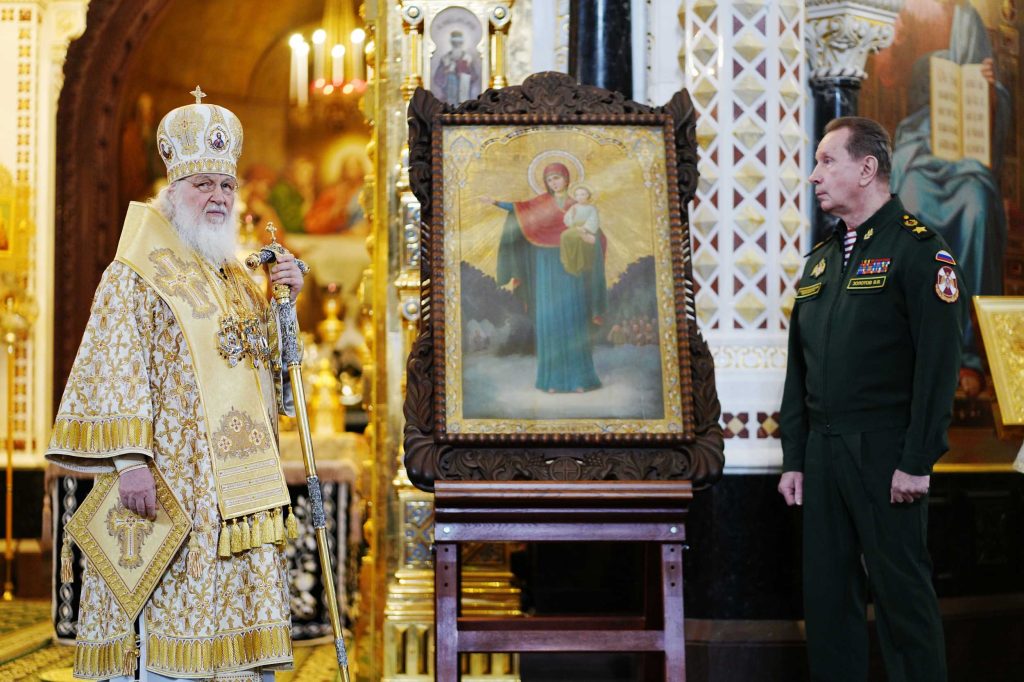
Michelle Coleman is a senior lecturer in law at Swansea University.
There is no doubt that Russia’s invasion of Ukraine on 24 February 2022 was an act of aggression by the Russian State. In international law aggression is generally understood as when a country either starts a war against another country or engages in actions that drive another country to go to war. It is grounded in the idea that attacking another country goes against the peace and security and victim states’ own sovereignty and right to self-determination.
People can be prosecuted for their role in planning and participating in the state’s aggressive acts at the International Criminal Court (ICC). However, due to a jurisdictional issue, Russians cannot be prosecuted at the ICC for invading Ukraine. To remedy this, a new Special Tribunal for the Crime of Aggression against Ukraine was created. Currently, only the Statute of the Special Tribunal is available, and it will be sometime before the Court is up and running. In the meantime, this blog explains what it means to prosecute aggression, the creation of the Special Tribunal, how this Tribunal differs from the ICC, and whether religious leaders can be prosecuted at the Tribunal.
Aggression in International Law
The idea that using force against another country is a violation of peace is relatively new, with origins in the early 20thcentury. It was developed in the Nuremberg Trials and by the League of Nations, and cemented in the UN Charter which prohibits aggressive war. In 1974 the UN General Assembly set out a definition of aggression as it relates to state interactions. This definition is considered a step towards defining the crime of aggression, because it enumerates aggressive activities and calls for aggression to be considered a crime against peace, however, it is directed at state actions and is not specific enough to allow for individual responsibility.
Under international law, there is no question that Russia’s invasion of Ukraine on 24 February 2022 was an act of aggression. This violated the UN Charter and authorized other states to take actions to try to stop Russia and support Ukraine; including sanctions and military support.
Aggression in International Criminal Law
While international law controls state actions, international criminal law holds individuals responsible for their own actions. International criminal law only holds individuals responsible; states cannot be prosecuted.
Until 2010, the crime of aggression did not have an agreed upon definition within international criminal law. The first time aggression was prosecuted was in the Nuremberg and Tokyo Tribunals following World War II. There they were prosecuted as “crimes against peace,” and these trials are seen as the birth of aggression as an international crime. While the crime was defined for use at these Tribunals, there was no international consensus as to whether a crime of aggression existed in international law. The crime of aggression was not included in the tribunals that followed, until the formation of the International Criminal Court in 1998. Aggression is one of the four core crimes that the ICC has jurisdiction over.
For the Court’s first 12 years, however, aggression was merely listed in Article 5 of the Court’s Statute and could not be prosecuted until a definition was adopted. That definition was not agreed upon or adopted until 2010 when Article 8biswas adopted at the Review Conference of the Rome Statute in Kampala. This article, and the other articles which helped provide support for the new crime within the Courts framework, are collectively known as the “Kampala Amendments.” Acceptance of these amendments was not automatic, States Parties to the ICC had to specifically ratify the new amendments accepting that the Court had jurisdiction over their nationals for this crime. Article 8bis was finally activated on 17 July 2018, allowing for aggression to be prosecuted if initiated by a state that had ratified the article.
Aggression, Ukraine, and the International Criminal Court
Initially, the ICC had jurisdiction over crimes arising in the Russia-Ukraine War because, while Ukraine was not a State Party, they accepted the ICC’s jurisdiction for crimes committed within their territory since November 2013. This gave the Court the ability to investigate and prosecute crimes that may have occurred as a result of the 2022 invasion and ongoing war and has allowed several arrest warrants to be issued. Despite the acceptance of the Court’s jurisdiction however, aggression could not be charged for the 2022 invasion. This is because neither Russia nor Ukraine was a State Party at the time, and for the Court to be able to prosecute aggression, article 15bis of the Rome Statute requires the alleged aggressor state to be a party to the Statute. The only exception to this rule is when UN Security Council refers the situation to the Court, however that did not occur on this occasion, in part because Russia is a permanent member of the Security Council.
Ukraine ratified the Statute in October 2024 and became a State Party to the ICC on 1 January 2025. In becoming a State Party, Ukraine accepted the Kampala Amendments. However, aggression still cannot be charged for the 2022 events, because Russia, as the alleged aggressor state, was not a State Party at the time the invasion took place.
Special Tribunal for the Crime of Aggression Against Ukraine
Because of the inability to prosecute aggression at the ICC in this situation, states and the Council of Europe, politicians, and experts have called for a new tribunal to investigate and prosecute aggression in Ukraine and complement the ICC and domestic efforts to prosecute crimes stemming from the war. On 14 May 2025, Ukraine specifically called upon the Council of Europe to set up establish a Special Tribunal for this purpose. On 24 June 2025, The Council of Europe published the “Statute of the Special Tribunal for the Crime of Aggression against Ukraine,” which was signed in Strasbourg by President Volodymyr Zelenskyy and the Secretary General of the Council of Europe, Alan Berset the next day. This Statute sets into motion the establishment of the Special Tribunal, defines aggression as a crime, and allows for the investigation and prosecution of the crime of aggression in Ukraine.

The Statute of the Special Tribunal
Unsurprisingly, the Tribunal’s statute resembles the ICC’s Rome Statute and the statutes of other international courts. Like these statutes it provides the general structure of the tribunal, defines the crimes, and lays out the general rights and responsibilities of parties to guarantee a fair trial. The Tribunal is to be located in a host state, presumably not Ukraine, which will be determined once a host state agreement is ratified. The structure of the Tribunal is similar to the ICC with Judges Chambers, Prosecution, and Registry all accounted for in Article 6. The judges and Prosecutor will be international and nominated by the Management Committee, which is similar to the process by which the ICC judges and Prosecutor are nominated. The Tribunal will have a much more limited jurisdiction however, as it will only prosecute the crime of aggression and the aggression will have occurred in Ukraine.
Jurisdiction
Article 1 of the Statute states that the Special Tribunal will have “power to investigate, prosecute and try persons who bear the greatest responsibility for the crime of aggression against Ukraine.” This appears to allow prosecution against anyone from any state who is allegedly responsible for aggression at any time, so long as Ukraine was the victim. By not limiting the jurisdiction by time or against Russia, it has the potential to be far more expansive in scope, making it possible that the Tribunal could also prosecute those responsible for the 2014 Russian occupation of Crimea and Belarusian involvement in aggression.
The idea that the Tribunal will focus on those who “bear the greatest responsibility” is similar to the ICC Office of the Prosecutor’s policy to try those who are “most responsible.” At the ICC this generally means heads of state, or heads of military or militia groups, but presumably it could also include other high-ranking officials of the state or other responsible groups. Both the ICC’s and the Tribunal’s statutes do not recognize head of state immunity. Presumably, this means that Putin could be tried at the new tribunal, however, it would be expected that if he, or another head of state were indicted at the Tribunal, they would fight this jurisdiction as they did not agree to be subject to the Tribunal’s jurisdiction or waive their immunity.
The Definition of Aggression
Article 2 provides how aggression will be defined by the tribunal. It largely follows the language of Article 8bis of the ICC Statute. Both specifically refer to the UN 1974 definition, however the ICC includes the specific examples provided in the UN Resolution. The Special Tribunal’s definition does not enumerate the UN’s examples but also includes “(4) For the purpose of this Statute, in the context of the aggression against Ukraine, an act of aggression which is determined by its character, gravity and scale to constitute a manifest violation of the Charter of the United Nations, shall also be deemed to constitute a war of aggression.” This appears to be a catch all provision that widens the definition to incorporate other acts not contemplated in the 1974 Resolution.
It is difficult to assess what this definition of aggression means for forthcoming trials, since that the 1974 Resolution and the ICC definition have not been tested in a criminal trial or interpreted by an international court. While the definition in the Special Tribunal’s Statute is fairly vague, specific elements, modes of liability, and possible defenses are still not specifically defined. It is implied that these will be included in the Rules of Procedure and Evidence which the judges will write once they are nominated.
Victim Participation
While there is no specific right to victim participation mentioned in the Statute, there are indications that victims can participate in the Tribunal’s proceedings. Article 22 states that when groups of victims are identified who are “specially affected by conduct which formed the basis of the crime as specified in the indictment” they will be collectively represented in the proceedings. There is no indication of what that representation will entail, and whether the legal representative will have participatory rights on the victims’ behalf during the proceedings. This is a sharp decrease in victims’ participation rights that have been developed at the ICC; however, it may be reflective of the nature of aggression as a crime. While individuals could be responsible for planning and carrying out aggression, the crime is committed against another state, meaning that traditionally the state is the victim, not individual people. Seen from this angle, the Statute is somewhat progressive in recognizing that it is possible for individuals to be specifically harmed by the aggressive activity and providing legal representation for those individual victims if they are identified. It will be interesting to see how this develops in practice.
Trials In Absentia
Articles 20 and 28 of the Statute allow for trials to occur without the accused person being present at court. This is typical of many countries, and reflects Ukraine’s Criminal Procedure Code which allows for in absentia trials. It is also in keeping with the war crimes trials already occurring in Ukrainian courts, over 100 of which have convicted people who were not present for their trial.
However, in absentia trials are not well supported in international criminal law. The defendants were required to be present at Nuremberg and very few international criminal courts and tribunals allow for trial in absentia. At the ICC, article 63 requires the accused person’s presence at trial unless they are too disruptive.
In absentia trials are controversial in international criminal law and can lead to real questions about the court’s legitimacy. On one hand there is tremendous pressure to provide criminal justice that is fair and swift to allow the state to repair itself, to provide justice for victims, and to allow witnesses to testify while they are available and their memories are fresh. On the other hand, there is a need to avoid victor’s justice and there are real questions about whether an international trial can be fair to the accused. To combat this, international courts holding trials in the accused person’s absence, including at the Special Tribunal, allow for a retrial if the accused person is later arrested after they have been convicted in absentia.
Prosecution of Religious Leaders
Leaders of the Russian Orthodox Church (ROC), and in particular, Patriarch Kirill, have supported this aggressive act and the war. Under Kirill’s leadership the ROC has developed an involvement in international affairs. It is alleged that Kirill’s vision of the “Russian World” provided a basis for the justification for Russia to invade Ukraine. Further, Kirill has called the war a “holy war” and February 2022 made a statement that Russian land “now includes Ukraine…”. These could be evidence that Kirill, or other leaders of the ROC were involved in Russia’s aggressive attack on Ukraine. If that is the case, and they are determined to be one of the people who “bears the greatest responsibility” then they could be prosecuted at the Tribunal.

However, only people who plan, prepare, initiate or execute the aggression and are “in a position effectively to exercise control over or to direct the political or military action of a State” (Special Tribunal Statute article 1(a)). This is a difficult obstacle to overcome when seeking prosecution for religious leaders. There would need to be a direct link between a leader and exercising control or directing the military or political action. Normally, religious leaders do not have such powers and so could not be prosecuted at the Special Tribunal. If, however, Kirill or another religious leader were proven to have such powers and have participated in the planning or execution of the aggression, then the Tribunal would be an appropriate place for them to be prosecuted for aggression.
Conclusion
The Special Tribunal for the Crime of Aggression against Ukraine offers to fill a gap in international criminal law, allowing for prosecution where other international courts cannot. While the Statute is largely similar to other international courts, the differences in jurisdiction, the definition of aggression, victims’ participation, and in absentia trials are significant. It will be interesting to see how these issues play out once the Tribunal is up and running. Hopefully there will be just and fair trials that complement the other trials for international crimes at the ICC and in Ukraine domestic courts. At the very least, the Tribunal should lead to interpretation of the definition of the crime of aggression, which will help move the law forward and possibly fill some gaps.
